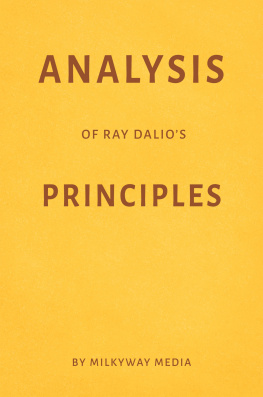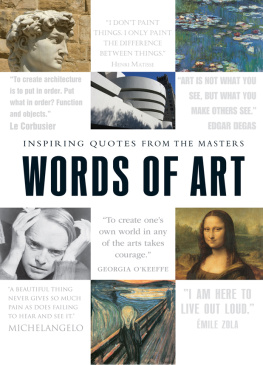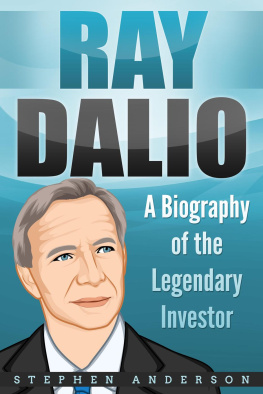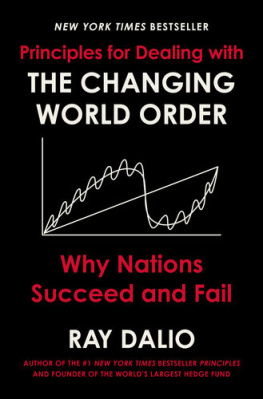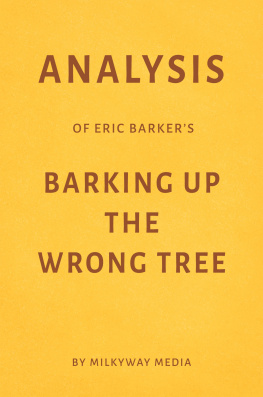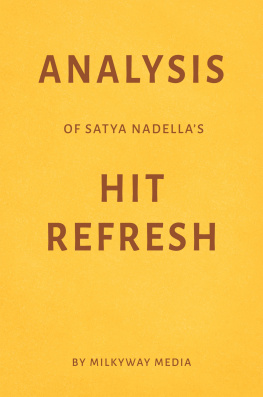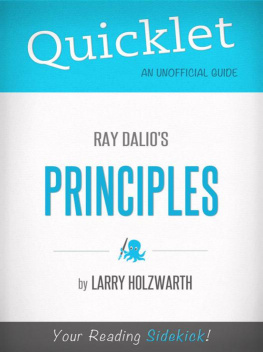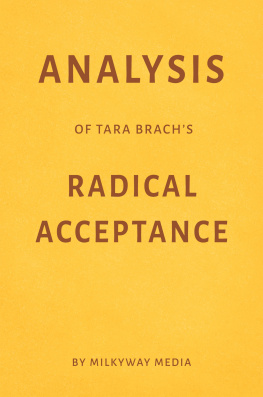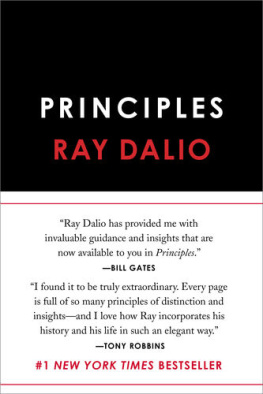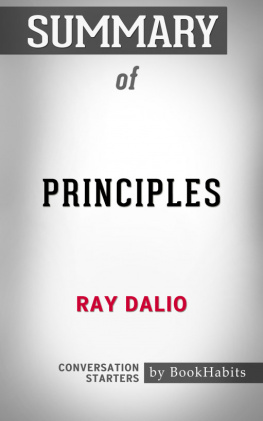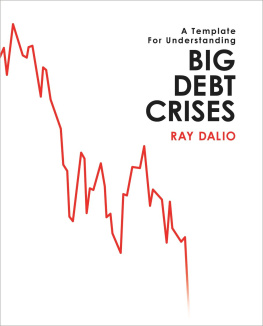Media - Analysis of Ray Dalios Principles by Milkyway Media
Here you can read online Media - Analysis of Ray Dalios Principles by Milkyway Media full text of the book (entire story) in english for free. Download pdf and epub, get meaning, cover and reviews about this ebook. publisher: Milkyway Media, genre: Politics. Description of the work, (preface) as well as reviews are available. Best literature library LitArk.com created for fans of good reading and offers a wide selection of genres:
Romance novel
Science fiction
Adventure
Detective
Science
History
Home and family
Prose
Art
Politics
Computer
Non-fiction
Religion
Business
Children
Humor
Choose a favorite category and find really read worthwhile books. Enjoy immersion in the world of imagination, feel the emotions of the characters or learn something new for yourself, make an fascinating discovery.
Analysis of Ray Dalios Principles by Milkyway Media: summary, description and annotation
We offer to read an annotation, description, summary or preface (depends on what the author of the book "Analysis of Ray Dalios Principles by Milkyway Media" wrote himself). If you haven't found the necessary information about the book — write in the comments, we will try to find it.
In Principles: Life and Work (2017), Ray Dalio describes core practices he developed during his career as an investor. Dalio believes that by applying these principles to their lives, readers can improve their relationships, enhance group decision making, and more easily adapt to changing circumstances.
Purchase this in-depth analysis to learn more.
Analysis of Ray Dalios Principles by Milkyway Media — read online for free the complete book (whole text) full work
Below is the text of the book, divided by pages. System saving the place of the last page read, allows you to conveniently read the book "Analysis of Ray Dalios Principles by Milkyway Media" online for free, without having to search again every time where you left off. Put a bookmark, and you can go to the page where you finished reading at any time.
Font size:
Interval:
Bookmark:
Analysis
of
Ray Dalios
Principles
Life and Work
by
Milkyway Media
Table of Contents
In Principles: Life and Work (2017), Ray Dalio describes core practices he developed during his career as an investor. Dalio believes that by applying these principles to their lives, readers can improve their relationships, enhance group decision making, and more easily adapt to changing circumstances.
Dalio divides his principles into two categories: life and work. Life principles aid in making logical decisions while maintaining an open-minded attitude with respect to feedback. Open-mindednessor as Dalio describes it, radical open-mindednessmeans being receptive to other points of view without letting ego interfere. Radical open-mindedness allows individuals to adjust to new information and allow their habits to evolve accordingly.
Evolution is the most important driving force in nature. In the span of a human life, evolution means learning from mistakes. This can sometimes be a painful process. But facing the pain caused by mistakes and personal weaknesses is a necessary step toward progress and the accomplishment of personal goals.
Success in life and work is possible through a five-step process. The first step is to establish a well-defined goal, one that is attainable, meaningful, and fulfilling. The second step is to identify specific obstacles to achieving that goal. The third step is to identify the root, or deepest cause, of each obstacle. These might be personal shortcomings that must be addressed before progress toward the goal can be made. The fourth step is to design a plan to overcome the obstacles, with a clear idea of who is best suited to carry out each part of the plan. The fifth step is to commit to the plan and complete it.
Throughout this five-step process, radical open-mindedness helps to identify and solve problems. Two psychological traps inhibit open-mindedness: the ego barrier and the blind spot. The ego barrier is a defensive instinct people use to avoid facing personal mistakes and weaknesses. The blind spot refers to the habit of clinging to a familiar way of thinking that fails to account for certain details or perspectives. Becoming aware that these barriers exist is the only way to get around the limitations they impose.
Any plan for achieving a goal requires making decisions. The way to make good decisions is to seek out others who have the most experience with the matter in question, especially those who have worked through similar circumstances in the past. They can explain clearly the cause-and-effect relationships involved in certain problems and situations.
Guided by these principles for maintaining radical open-mindedness, anyone can find success in life and work.
- On a planetary and historical scale, individual actors seldom affect larger processes. Through continual adaption and improvement, natural evolution benefits the whole, rather than one individual.
- The struggle between emotional reactions and logical reasoning affects decision making.
- Reflecting on pain, as opposed to avoiding it, leads to more learning and evolving.
- Radical open-mindedness and thoughtful disagreement lead to more balanced views and better decision making.
- Managing a company as an idea meritocracy, in which opinions are valued based on the speakers merit, makes a company more efficient and effective.
- It is useful to determine best outcomes based on probability and reward.
- As a manager, understanding an employees thought process is just as important as understanding his or her outcomes.
- Keeping employees in a company in sync while encouraging debate and disagreement is difficult, but its a healthy way to run a business.
On a planetary and historical scale, individual actors seldom affect larger processes. Through continual adaption and improvement, natural evolution benefits the whole, rather than one individual.
Analysis
Witnessing hyenas kill a wildebeest in the wild may be horrifying, but it is part of a natural process that benefits both hyenas and wildebeests. Likewise, seeing the big picture, and being open to different points of view, is necessary to understand and value the health of a whole company.
Natural evolution is a useful metaphor for understanding how a company can operate effectively. For example, viruses are highly adaptive and constantly develop new ways to overcome the bodys defense mechanisms. Yet the body is constantly developing improvements, through genetic changes, to outwit the viruses. In a paper published in 2016, geneticists at Stanford University published research which they believe demonstrates that genetic changes occur in proteins for the purpose of protecting the human body from viruses; approximately 30 percent of all adaptive genetic mutations in proteins are mutations that guard against viral infections. These adaptive mutations help an organism to survive danger or stress. Studying these processes can inform and inspire more effective business practice.
The struggle between emotional reactions and logical reasoning affects decision making.
Analysis
The conscious mind is controlled by the prefrontal cortex and manages logic and reasoning. It is in constant struggle with the subconscious mind, which is controlled by the amygdala. Fears and desires develop in the subconscious and lead to actions, such as fight or flight, that are often at odds with logical thinking.
Researchers have shown that mindfulness meditation may be a useful tool in managing emotion. Scientists in Italy and Denmark conducted experiments in which participants were connected to brain scanners and given psychotherapy treatment. Participants who regularly practiced mindfulness meditation showed less activity in the amygdala compared to those who did not practice mindfulness. The group that practiced mindfulness had high activity in the neocortex, the part of the brain engaged in logical thinking. The study suggests that meditation may be an effective way to manage the struggle between feelings and rational thinking.
Reflecting on pain, as opposed to avoiding it, leads to more learning and evolving.
Analysis
Working towards ambitious goals will lead to painful experiences. The learning process requires pushing hard through challenges and stretching limits, which reveals personal weaknesses. Personal growth derives from reflecting on these painful experiences rather than avoiding them. Deep reflection makes it easier to understand the cause of the pain, identify what the problem is, and then work to minimize that problem.
Variants of self-reflection form part of the practices of Alcoholics Anonymous, Buddhist meditation, and many other spiritual and religious groups. A common challenge posed by these and other forms of self-reflection is that of confronting personal shortcomings and the pain they might cause. Psychologists continue to debate what motivates people to engage in self-improvement. According to psychologist Allen McConnell, the pain of not having achieved an important goal offers motivation to keep trying. Regret over not having accomplished something important plays a key role in self-improvement.
Radical open-mindedness and thoughtful disagreement lead to more balanced views and better decision making.
Analysis
Radical open-mindedness describes the process of learning to be effective at understanding other points of view without interference from the ego or allowing a blind spot to get in the way. Radical open-mindedness means not becoming obsessed with being right and instead focusing on learning from others. When two people disagree, they can still facilitate open-mindedness by sharing their views in a respectful manner. They can then determine where the truth lies and how best to move forward with that knowledge.
Next pageFont size:
Interval:
Bookmark:
Similar books «Analysis of Ray Dalios Principles by Milkyway Media»
Look at similar books to Analysis of Ray Dalios Principles by Milkyway Media. We have selected literature similar in name and meaning in the hope of providing readers with more options to find new, interesting, not yet read works.
Discussion, reviews of the book Analysis of Ray Dalios Principles by Milkyway Media and just readers' own opinions. Leave your comments, write what you think about the work, its meaning or the main characters. Specify what exactly you liked and what you didn't like, and why you think so.

